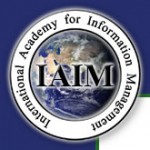Today Chad Anderson reported on the ground work for his dissertation. He cited several Organizational scholars who have called for more theorizing in how materiality relates to the IT artifact.
He then related the theory of affordances which originated from Gibson’s 1979 work in Ecological Psychology. Gibson died shortly after proposing the theory, and many others have gone on to explicate it. Chad relates affordances to IT research as the relationship between “features of an information system and the abilities of an individual within the context of an environment.” It will be interesting to see where this goes… and I am sure Chad can correct me if I mis-discribing something!
This colloquium session was a bit more theoretical than most, but very interesting.

 In a very provocative research seminar at GSU yesterday,
In a very provocative research seminar at GSU yesterday, 

Recent Comments